
... from Gay's
Autograph Book
Unsung Heroes
From Gabrielle Stratford née Talbot
Tad Nagaki's entry into my autograph album triggered a question: had he sensed that the camp in Weihsien was an extraordinary community?
He said that he was saddened by the thought that we would all soon go our separate ways. Strange to feel an attachment to an internment camp. - - - - - -
It is fair to say that we all realise that it was a place in which we met unforgettable people:
— Eric Liddell for one who was respected by all. A man of faith — with a gentle smile and a generous heart. He was a superb athlete.
— Then the Chefoo School teachers who were in loco parentis for so many children. They fulfilled their role with great dedication and deserved credit.
— Also the seven Americans who descended from the sky that day in August. All these were wonderful, but I would like to draw attention to those who contributed to daily life in the camp. This is a word memorial to them all. –
— It was early in 1943. We lived in Chinwangtao, in the province of Hopei on the gulf of Peichili. Our family consisted of Ida, Sid, and three children. Christine, the youngest was seven months old.
— In the middle of March, we were ordered to leave the house with what we could carry, and walk to the station to board a train. We could take very little since Christine had to be carried in her mosses basket. The train stopped frequently to pick up other 'enemy nationals' along the way to Tientsin. It was packed tightly by then. There we had to disembark. Our belongings were piled up in the middle of a circle and we sat on the suitcases. A ring of Japanese soldiers with bayonets drawn faced us. It seemed that this display of force was enacted for the benefit of the Chinese in the station.
— After some hours, we were martialled back onto the train and continued on. Suddenly there was a lurch as the train came to a stop. This time we were in the country with no station in sight. The guards left the train and treated us to a display of calisthenics. Later we learned that the track ahead had been sabotaged and needed to be repaired before we could proceed. This trip took two or three days.
— Anyway, back to Weihsien. — It was evening. — In the dim light I saw the gates opening slowly for the series of trucks which had brought us from the station. We were tired and anxious. As we climbed down, we were greeted by a nun, (Sister Eustella I believe). In her hands she held a cup of watery soup for us. Her smile was welcoming as she assigned our family a thin mattress on the floor. We curled up together and slept.
— The first prisoners in the camp were priests and nuns. Eventually there were hundreds of them including five Bishops. They provided the beginnings of the inner structure of the camp from which we would all benefit. They took on the worst jobs: cleaning latrines, washing dishes for hundreds with such good grace. Cleaning out public buildings including the hospital ,which was just a shell.
— Eventually that quarter mile square accommodated fifteen hundred people from all walks of life. The organisation was superb. There was a managing council which oversaw camp discipline, health, entertainment, sports, ran three kitchens, and so on. To these adults we owe our survival…
- - - - To the doctors and nurses who brought new life into the world, treated the sick with the few resources they had, and helped to prevent epidemics and disease.
- - - - To those who pumped the water into cisterns day and night.
- - - - To the cooks who fed us as best they could, including the bakers (our Dad was one) who worked eight hour shifts stoking fires and punching dough in cold and heat.
- - - - To those who maintained the latrines and cleaned the shower huts.
- - - - To those who caught and killed flies.
- - - - To those who taught us in makeshift schools without text books, paper or pencils.
- - - - To those who gave adult classes in dozens of languages, art, music, theology, philosophy and countless other disciplines.
- - - - To those who organised sports, ran clubs and scout and guide troops.
- - - - To those who mounted plays, gave concerts, put on variety shows, arranged talks.
- - - - To those who were black marketeers, and kept us informed about the outside world.
- - - - To the Chinese who traded with us and those honeypot carriers who brought us news.
- - - - To the members of Christian churches who shared the same building for two years, showing respectful oecumenism before the word was common.
- - - - To the priests and nuns who showed me Christian faith in action.
- - - - To those who rushed out of the gate at the risk of their lives to rescue the rescuers.
- - - - To all of these unsung heroes, I give heartfelt thanks, honouring their memory, and praying for their souls.
- - - - Please feel free to remind us of others who have made a difference.- - - - .
- - - - - - - - - - -
#
Gay Talbot Stratford

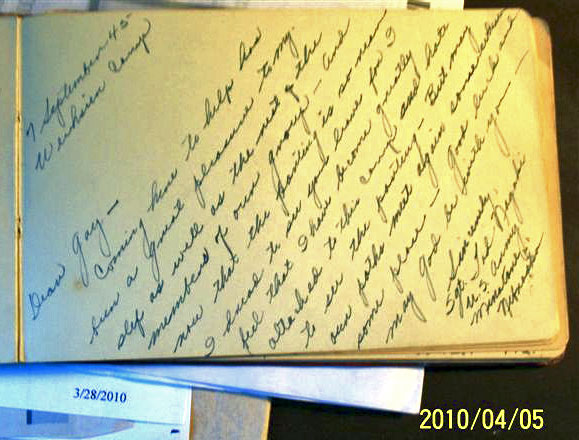
I do not remember the 7th of September which is the date of this note: Dear Gay, Coming here to help has been a great pleasure to myself as well as the rest of the members of our group- and now that the parting is so near I dread to see you leave for I have become greatly attached to this camp and hate to see the parting- But may our paths meet again some where some place. Good luck and God be with you.Sincerely Sgt. Tod Nagaki

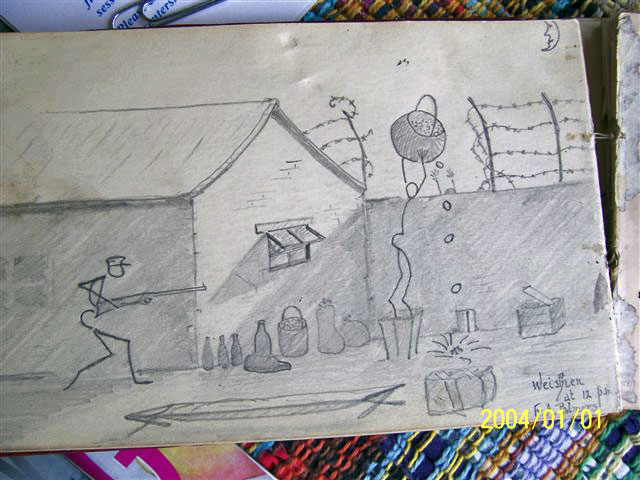
This is a cartoon sketched by Father Palmer which may need some explanation.
Mother, Ida Talbot, and Robbie( Dr. Robinson) were the Resident Black Marketeers of Block 1.
A knock on the outer wall during the night was the prearranged signal for a consignment of food or cigarettes. The marketeers would rush to the wall to receive the goods and the Chinese entrepreneur was paid in jewelry or money. The contraband was stashed under the childrens'beds.
On this day, the contact was more daring, and came to the wall in broad daylight. The guard in the watch tower saw him, and there was a furious knocking on the wall.
Mother and Robbie were not there, so my poor unsuspecting father rushed to the wall as the guard came clanking into the compound . There he was , caught redhanded with the goods.
The guards dragged their prisoner off leaving us scared to death.
Mother was most upset as Dad was ill. Robbie managed to convince the authorities to allow a medical visit each day. He brought food and made sure that his patient was convalescing.
The two of them were great friends and jokers, but I wonder if Dad got the joke when he found a book entitled : ' My First Twenty Years in Sing-Sing .' hidden under the food!


Saturday evening dances ...

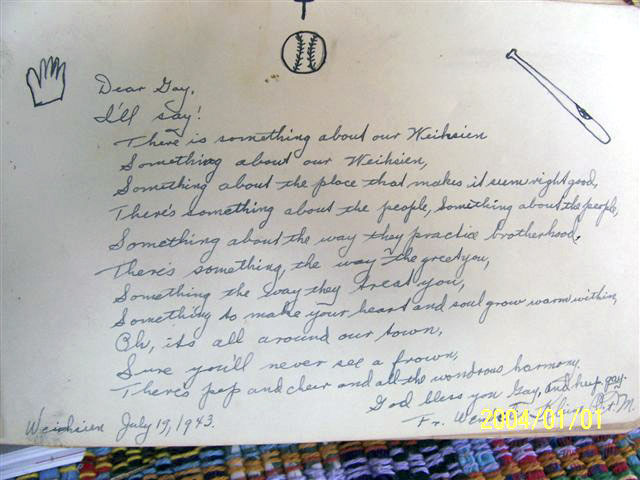
Father Heier penned these words .
It was a popular song in Weihsien sung to the tune of: 'There's something about a Sailor.' He played short stop on the Padres softball team and I believe he had been a proffessional ball player before he became a priest. He was an American Franciscan. I admired him greatly.

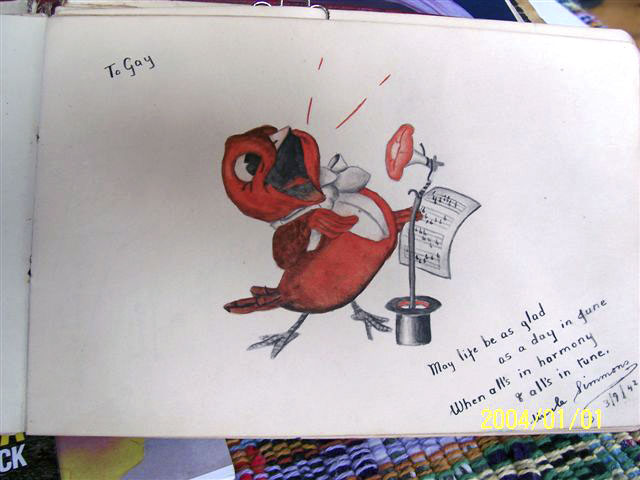
Pamela Masters, née Simmons

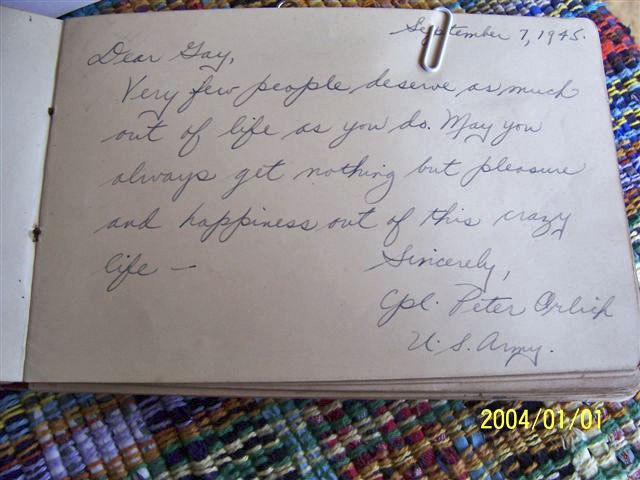
Peter Orlich, Corporal - U.S.Army.

.jpg)
.jpg)
Included are the signatures of the five Catholic Bishops in Weihsien. They were eventually transfered to Beijing. Most are Dutch or Belgian . Bishop Pinger was American. I believe he returned to his diocese after the war and was badly treated before he was returned to the US.

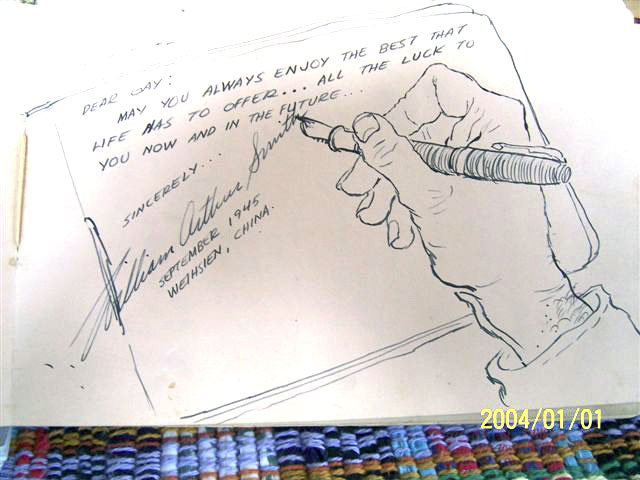
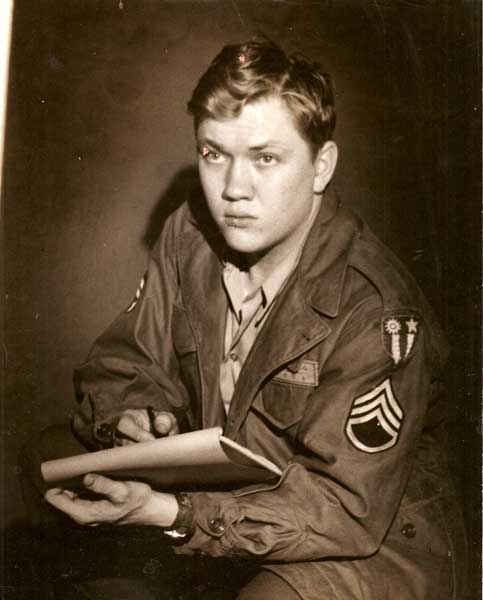
William A. Smith, War correspondent.





